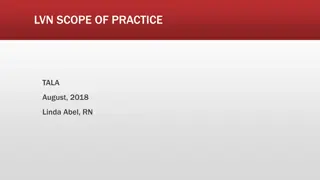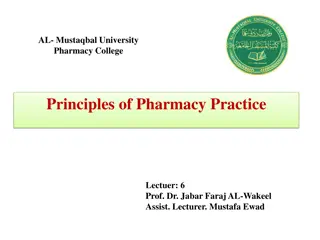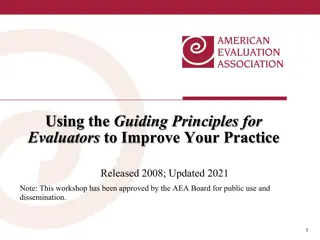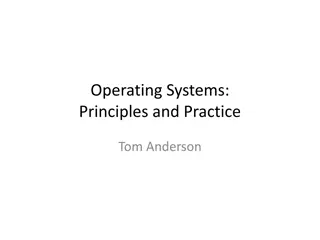Principles of the Ghana Civil Service Code of Conduct
The Code of Conduct for the Ghana Civil Service, outlined by Elizabeth Obeng-Yeboah, emphasizes principles such as abiding by the constitution and laws with dignity, integrity, and professionalism. It sets standards for conduct, avoiding conflicts of interest, maintaining political neutrality, and u
1 views • 34 slides
Competencies and Scope of Practice for Registered Nurses in New Zealand
The Competencies and Scope of Practice for Registered Nurses in New Zealand focus on regulating nursing practice to ensure public safety. Registered Nurses are expected to utilize nursing knowledge and judgment to assess health needs, provide care, and support individuals in managing their health. T
4 views • 25 slides
Nursing and Midwifery Practice Placement Allocations Office Orientation
The Practice Placement Allocations Office (PPAO) ensures students gain experience in specific practice placement areas required for registration by the Nursing and Midwifery Board of Ireland. The BSc programmes include theory and practice placements, aiming for professional registration with NMBI. P
1 views • 16 slides
Academic Freedom and Shared Governance in Higher Education
Academic Freedom and Shared Governance are foundational principles advocated by the American Association of University Professors (AAUP) to ensure educators have the freedom to explore, research, teach, and discuss without censorship. These principles empower educators to enhance student learning an
0 views • 9 slides
Essential Principles of Management Discussed in Seminar
Explore the foundational principles of management discussed in a seminar on principles of management. Delve into topics such as division of work, authority, discipline, unity of command, and unity of direction as outlined by Henri Fayol. Gain insights into the importance of these principles for effe
0 views • 22 slides
International Law of War: Nuremberg Principles and Accountability
The Nuremberg Principles, derived from the trials of Nazi officials for war crimes, establish accountability in international law. These principles hold individuals responsible for committing acts considered crimes under international law, regardless of their position or orders received. The assumpt
2 views • 22 slides
Overview of APRN Regulation and Practice in Oklahoma
This content delves into the regulation and practice of Advanced Practice Registered Nurses (APRNs) in Oklahoma. It covers who regulates nursing practice, the roles and populations of APRNs, examination of laws related to CNP practice, approved certifications for APRN licensure, and updated legislat
0 views • 33 slides
Advanced Clinical Practice Framework and Pillars of Practice
The document discusses the advanced clinical practice framework and the four pillars of practice which include leadership & management, clinical practice, education, and research. It emphasizes the importance of core capabilities and area-specific competence in advanced clinical practice. The role o
2 views • 8 slides
Promoting Ethical Principles in Social Science Research
Explore the challenges and strategies for translating and applying ethical principles, especially in emergency contexts. Learn key questions in social science research and how to ensure information contributes to community actions. Understand the importance of considering ethical principles in all w
0 views • 21 slides
Enhancing Professional Practice through Reflective Practice
Reflective practice is an essential ongoing process in professional practice with children and families. It involves honest, deep, and critical thinking to improve outcomes, challenge assumptions, and seek collaboration. Through reflective practice, educators can recognize good practices, address ch
0 views • 35 slides
Ethical Considerations in School Psychology: Navigating Codes and Principles
Explore ethical considerations in school psychology, encompassing ethical codes, legal requirements, and professional principles to address dilemmas and promote integrity. Gain insights into key ethical codes, legal mandates, and overarching ethical principles relevant to school psychologists' pract
1 views • 31 slides
Importance of Research in Social Work Practice
Understanding the significance of research in social work practice is essential for maintaining accountability and professionalism. Social workers are urged to engage in practice-informed research, evaluate interventions diligently, and promote responsible research practices. By utilizing the five w
0 views • 24 slides
Doctorate in Business Administration and Professional Practice
Explore the world of Doctorate in Business Administration and Professional Practice, tailored for working professionals seeking to bridge the gap between academia and industry. Gain skills in evidence-based practice, critical thinking, and innovative problem-solving to enhance your academic status.
0 views • 13 slides
Understanding LVN Scope of Practice in Texas
Explore the role of the Board of Nursing, review LVN Scope of Practice, differentiate between RN and LVN nursing practice, and consider models for safe LVN practice in Alabama. Learn about the history and purpose of the Board of Nursing, standards of nursing practice for all nurses, and specific res
0 views • 38 slides
Safe Practice Principles for Systemic Anti-Cancer Therapy (SACT) 2019
Systemic Anti-Cancer Therapy (SACT) involves chemotherapy and targeted agents for cancer treatment. Risks include errors with non-accredited staff, incomplete prescriptions, incorrect dosing, and patient education deficiencies. Safe practice principles emphasize specialist care, established protocol
0 views • 25 slides
Understanding the Practice of Law and Licensing Requirements
Exploring the practice of law, the unauthorized practice of law, the public interest considerations, and the activities that constitute legal practice according to the Supreme Court Committee on the Unauthorized Practice of Law. It delves into the essential aspects of legal profession, defining lega
0 views • 35 slides
Study Guide for Principles of Management Course at Africa Research University (ARU)
Welcome to Africa Research University (ARU)! This study guide is designed to help you navigate through the Principles of Management course (Course Code: PRM4) at ARU. It provides an introduction to the course content, emphasizing the importance of developing management skills to effectively lead and
1 views • 40 slides
Key Principles of Insurance Explained with Visuals
Understanding the principles of insurance is crucial for both insurance seekers and companies. The principles include Utmost Good Faith, Insurable Interest, Indemnity, Contribution, and Subrogation. These principles ensure transparency, fairness, and protection for policyholders. Visual representati
0 views • 6 slides
Education Needs Analysis Nurses working in General Practice
Comprehensive results from a study on educational needs analysis for nurses working in general practice in Scotland have been collected to guide education provision for General Practice Nurses. The analysis includes demographic information, career aspirations, and preferences for study schedules. Th
0 views • 34 slides
Principles of Training: Overload, Specificity, and Progression
Principles of training encompass overload, specificity, and progression. Overload requires doing more than usual, specificity involves tailored activities, and progression ensures gradual advancement. These principles are vital for improving fitness levels safely and effectively, emphasizing the nee
8 views • 17 slides
Effective Professional Practice in Social Services
Enhance your professional practice in social services by understanding and utilizing codes, legislation, data handling, and partnership working. Learn how continuing professional development (CPD) guides and improves practice to meet standards in the context of working in Wales. Embrace the duty of
0 views • 53 slides
Comprehensive Overview of Exercise Science and Training Principles
Explore various aspects of exercise science and training principles including types of practice, stages of learning, methods of practice, goal setting, energy systems, nutrition, performance components, fitness testing, and more.
1 views • 13 slides
Understanding Practice Drift in Nursing: Risks and Consequences
Explore the concept of practice drift in nursing, where nurses may deviate from standards leading to unsafe practice. Learn how to identify and prevent practice drift, understand scope of practice, and adhere to state regulations. Discover the importance of following the Model Nurse Practice Act and
0 views • 35 slides
Effective Partnership and Mutual Accountability in Nutrition Clusters
The content discusses the minimum commitments needed for participation in Nutrition Clusters, explains the Principles of Partnership, and explores how these principles can enhance coordination and accountability to affected populations. It emphasizes partner commitments, such as leadership, mainstre
0 views • 7 slides
Mastering Skills Through Purposeful Practice
Mastering skills, such as perfect pitch in music, requires purposeful and deliberate practice from a young age. The brain's adaptability diminishes after six years old, emphasizing the importance of early training. Effective practice involves setting specific goals, receiving feedback, and pushing b
0 views • 23 slides
Overview of Fundamental Principles of Space Law and Outer Space Treaties
The content discusses the fundamental principles of space law highlighted at the United Nations Space Law Conference 2020, focusing on key treaties such as the Outer Space Treaty of 1967 and associated rights, duties, and obligations of states in space exploration and use, including non-appropriatio
0 views • 16 slides
Overview of Directive Principles of State Policy in Indian Constitution
Directive Principles of State Policy (DPSP) in the Indian Constitution encompass social, economic, and political programs aimed at realizing ideals of justice, liberty, equality, and fraternity. They are non-justiciable but guide the state in legislative matters. Classified into Socialistic, Gandhia
0 views • 24 slides
Nursing Ethics and Practice Guidelines Overview
Explore the fundamentals of ethical decision-making in nursing, delve into ethical dilemmas, review the principles of nursing ethics, and understand the importance of State Practice Acts. Learn how the National Council of State Boards of Nursing provides a framework for safe and professional nursing
0 views • 30 slides
Collaborative Strategies for Advancing DNP Education and Practice
The comprehensive discourse covers gathering resources for a statewide initiative on DNP education and practice, effectiveness of collaborative discussions between academia and practice, and outcomes of bridging education and practice. It also emphasizes the purpose of uniting education and practice
0 views • 30 slides
Effective Client Management and Public Relations in Veterinary Practice
Proper client management and effective public relations are crucial in veterinary practice for ensuring the well-being of animals. Establishing a strong veterinarian-client-patient relationship, maintaining patient records, and upholding principles of veterinary ethics are essential for providing qu
0 views • 24 slides
Understanding FAIR Principles in Biomedical Research
The FAIR principles - Findable, Accessible, Interoperable, and Reusable - provide a framework for ensuring scientific data in biomedical research is managed and shared effectively. This informative session delves into the theory and practice of FAIR principles, emphasizing the importance of data qua
0 views • 28 slides
The FAIR Principles for Data Management and Stewardship
Embrace the FAIR principles - Findable, Accessible, Interoperable, Re-usable - for effective scientific data management and stewardship. Learn how annotations enhance data FAIRness and the key attributes of each principle. Dive into the high-level guiding principles that ensure data is globally uniq
0 views • 25 slides
Understanding Ratio Strength and Milligrams Percent in Pharmacy Practice
In the field of pharmacy practice, understanding ratio strength and milligrams percent is essential for preparing solutions accurately. Ratio strength involves expressing concentrations in parts per hundred, while milligrams percent denotes the amount of substance in 100 mL of liquid. This article e
0 views • 10 slides
Understanding the Guiding Principles for Evaluators
This content provides insights into the Guiding Principles for Evaluators, including their history, assumptions, and key principles such as Systematic Inquiry and Competence. The workshop aims to increase knowledge about ethical evaluation practices and stimulate discussions within the evaluation co
0 views • 22 slides
Guiding Principles for GETSI/INTEGRATE Webinar – Materials Development and Goals
The webinar presented by David Steer from the University of Akron focuses on guiding principles for material development in the context of GETSI/INTEGRATE modules. It outlines goals for the session, including discussing components of the guiding principles, examples of meeting those principles, and
0 views • 13 slides
Understanding Henri Fayol's 14 Principles of Management
Henri Fayol, the Father of Modern Management, introduced 14 Principles of Management in 1916, outlining essential guidelines for effective management. These principles cover areas such as division of work, authority and responsibility, discipline, unity of command, and unity of direction. By followi
0 views • 19 slides
Principles of Management: Understanding Henri Fayol's 14 Key Principles
Explore the foundational principles of management through the lens of Henri Fayol's 14 key principles, which offer valuable insights into managerial decision-making and organizational interactions. Delve into the history of Henri Fayol, his contributions to management theory, the concept of authorit
0 views • 14 slides
Legal Principles of Insurance
The legal principles of insurance include indemnity, insurable interest, subrogation, and utmost good faith. These principles ensure fair compensation, financial risk protection, and honesty in insurance contracts. Understanding these principles is crucial for both insurers and policyholders to navi
0 views • 18 slides
Principles of Pharmacy Practice and Common Systems of Measurement
Explore the principles of pharmacy practice, including the apothecaries and avoirdupois systems of measurement. Learn about apothecaries fluid and weight measures, as well as intersystem conversion methods. Understand how to convert between different measurement systems for accurate pharmaceutical f
0 views • 12 slides
Understanding Operating Systems: Principles and Practice in CSE Curriculum
Dive into the world of operating systems through the lens of "Operating Systems: Principles and Practice" by Tom Anderson. Discover how this course fits in the UW CSE curriculum, covering systems programming, operating system interfaces, and distributed systems. Explore the project work on building
0 views • 21 slides







































